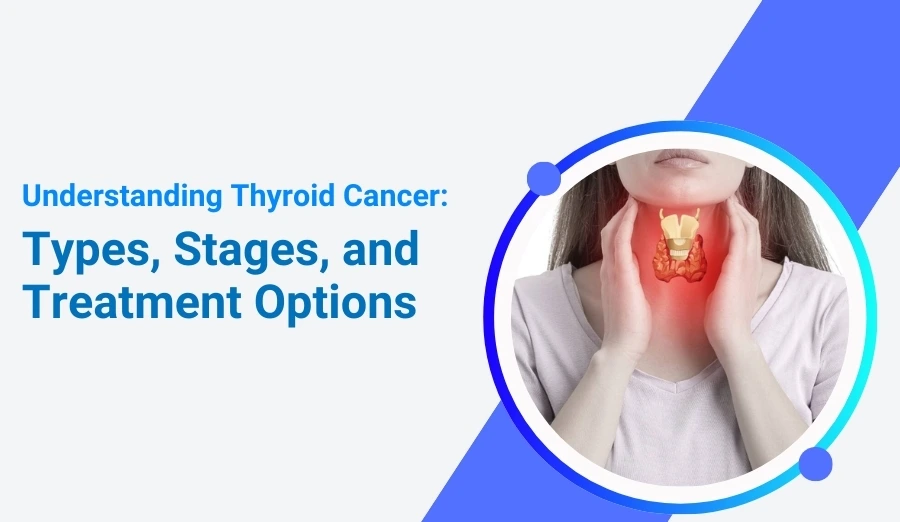-
BP Poddar Hospital
BP Poddar Hospital

Hello Reader!
Welcome to the blog page of Dr. Sunny Khanna, one of the best oncologist in Kolkata.
Thyroid cancer is a serious yet often treatable condition that affects the thyroid gland, a small but vital organ located at the base of the neck. As the best oncologist in Kolkata, I have encountered numerous cases where early diagnosis and proper intervention have led to successful treatment outcomes. In this blog, we will explore the different types, stages, and treatments of thyroid cancer, helping patients and caregivers make informed decisions.

Understanding the different types of thyroid cancer is crucial for determining the most effective treatment approach. The main types include:
This is the most common form of thyroid cancer, accounting for approximately 80% of cases. It grows slowly but can spread to the lymph nodes. Despite this, it has a high survival rate with proper treatment.
FTC makes up around 10-15% of thyroid cancer cases and can spread to the lungs and bones. It is slightly more aggressive than PTC but remains treatable with early intervention.
MTC accounts for 3-4% of cases and arises from the C cells of the thyroid, which produce calcitonin. It can be sporadic or hereditary, requiring genetic screening for at-risk family members.
ATC is the rarest and most aggressive form of thyroid cancer, constituting less than 2% of cases. It spreads rapidly and requires immediate, intensive treatment.

Early symptoms of thyroid cancer can often be subtle and may not be immediately recognized as signs of a serious condition. However, awareness of these symptoms is crucial for early detection and effective treatment. Here are some common early symptoms associated with thyroid cancer:
One of the most noticeable early signs of thyroid cancer is the presence of a lump or nodule in the front of the neck. This lump is usually painless, and firm, and may grow slowly over time. If you notice a new lump or an existing one that is increasing in size, it’s important to consult a healthcare professional.
Changes in your voice, particularly persistent hoarseness, can indicate thyroid cancer. This symptom arises when the tumor affects the vocal cords or surrounding structures. If hoarseness lasts for more than a few weeks without improvement, it should be evaluated by a doctor.
As the thyroid tumor grows, it may press against the esophagus or trachea, leading to difficulty swallowing (dysphagia) or breathing (dyspnea). These symptoms warrant immediate medical attention, especially if they worsen over time.
Some individuals may experience pain in the front of their neck or throat that can radiate to the ears. While neck pain can be caused by various conditions, persistent pain should be assessed by a medical professional.
Swelling in the neck, particularly around lymph nodes, may occur as thyroid cancer progresses. Enlarged lymph nodes can indicate that cancer has spread beyond the thyroid gland.
A chronic cough that is not related to a respiratory infection may also be an early sign of thyroid cancer. If you have a cough that lingers for weeks without an apparent cause, it’s advisable to seek medical evaluation.
Unexplained weight loss and changes in appetite can occur with advanced thyroid cancer but may also manifest earlier in some cases. If you experience significant weight loss without trying to lose weight, consult a healthcare provider.
Additional symptoms may include flushing of the face, softer stools or diarrhea, and fatigue. While these symptoms are less specific, they can still be associated with thyroid dysfunction or malignancy.
The staging of thyroid cancer is essential for determining the most appropriate treatment plan. Staging is based on tumor size, lymph node involvement, and metastasis (spread to other parts of the body).

Thyroid cancer is typically staged using the AJCC (American Joint Committee on Cancer) TNM system, which considers three key components:
The combination of these factors helps classify the cancer into specific stages, which range from Stage I (localized) to Stage IV (advanced with distant spread).
Also Read: The Crucial Role of Breast Biopsy in Breast Cancer Surgery

As the best oncologist in Kolkata, I emphasize a personalized approach to treatment based on the cancer type and stage. Here are the primary treatments of thyroid cancer:
Surgical removal of the thyroid gland (thyroidectomy) is the most common treatment. Depending on the extent of the disease, either a partial or total thyroidectomy may be performed.
RAI is used after surgery to eliminate any remaining thyroid cells and reduce the risk of recurrence. It is particularly effective for papillary and follicular thyroid cancers.
Since the thyroid gland regulates metabolism through hormone production, patients require lifelong thyroid hormone replacement therapy after surgery. This also helps suppress tumor recurrence.
For advanced or inoperable cases, external radiation therapy may be used to control tumor growth and alleviate symptoms.
Targeted drugs are designed to attack specific genetic mutations in thyroid cancer cells, making them a promising option for medullary and anaplastic thyroid cancers.
While chemotherapy is not commonly used for thyroid cancer, it may be recommended for aggressive or treatment-resistant cases, particularly anaplastic thyroid cancer.

Thyroid cancer treatment has evolved significantly in recent years, driven by advancements in targeted therapies, biomarker research, and innovative treatment approaches. As a leading oncologist in Kolkata, I am committed to staying informed about these developments to provide the best care for my patients. Here’s an overview of the latest advancements in thyroid cancer treatment.
Targeted therapies have emerged as a promising option for treating various types of thyroid cancer, particularly advanced and radioiodine-refractory cases. These therapies focus on specific molecular targets within cancer cells, minimizing damage to healthy tissues. Notable targeted drugs include:
The development of these targeted therapies represents a shift away from traditional chemotherapy, which often has limited effectiveness against thyroid cancer.
Recent advancements in biomarker research have significantly impacted treatment strategies for thyroid cancer. Identifying specific genetic mutations and molecular profiles allows for personalized treatment plans tailored to individual patients. Key developments include:
Immunotherapy is gaining traction as a potential treatment option for advanced thyroid cancers that do not respond to conventional therapies. Immune checkpoint inhibitors, such as pembrolizumab and nivolumab, are being studied for their effectiveness in treating resistant forms of thyroid cancer. These therapies aim to enhance the body’s immune response against cancer cells.
Combining different treatment modalities is becoming increasingly common in managing advanced thyroid cancer. For instance, combining targeted therapies with immunotherapies or traditional treatments like radioactive iodine can enhance overall effectiveness and improve patient outcomes.
Innovations in imaging technologies are improving the diagnosis and management of thyroid cancer. Artificial intelligence applications are being integrated into diagnostic imaging to better differentiate between benign and malignant nodules. Enhanced imaging techniques facilitate more accurate staging and treatment planning.
Numerous clinical trials are underway to evaluate new drugs and treatment combinations for thyroid cancer. These studies aim to identify more effective therapies with fewer side effects, expanding the options available for patients with advanced or resistant forms of the disease.

The four main types are Papillary, Follicular, Medullary, and Anaplastic thyroid cancer, with Papillary being the most common and Anaplastic the most aggressive.
Thyroid cancer is diagnosed through physical exams, ultrasound, fine-needle aspiration biopsy, and blood tests to check thyroid function and tumor markers.
Treatments include surgery, radioactive iodine therapy, hormone therapy, external beam radiation, targeted therapy, and chemotherapy, depending on the cancer type and stage.
Yes, many cases, especially early-stage papillary and follicular thyroid cancers, have high cure rates with proper treatment.
If you notice a lump in the neck, difficulty swallowing, persistent hoarseness, or swollen lymph nodes, consult a doctor immediately for evaluation.
Early detection and appropriate treatments of thyroid cancer can lead to successful outcomes and improved quality of life. If you or a loved one is experiencing symptoms such as a lump in the neck, difficulty swallowing, or voice changes, seek immediate medical attention. As the best oncologist in Kolkata, Dr. Sunny Khanna is committed to providing expert guidance and advanced treatment options for thyroid cancer patients. Timely intervention and a comprehensive treatment plan can make all the difference in fighting this disease.
For more information or to schedule a consultation, feel free to reach out and take proactive steps toward better health.

January 30, 2025

January 29, 2025

January 28, 2025